In January, a team of student recipients of UNH’s International Changemaker Grant traveled to Senegal to embark on a journey of high-impact learning in partnership with non-profit, Full Bucket Foundation. Becaye Gueye '24, Sustainable Agriculture and Food Systems, Jesus La Paz '26, Analytical Economics and Justice Studies and Syeda Khadija Haq (Dija) '26, Business Administration and Economics reflect on their experiences here. The team was advised by Dr. Iago Hale, Associate Professor and Program Coordinator, Sustainable Agriculture and Food Systems, and Seth Wilner, a UNH Extension Agricultural Business Management Field Specialist; you can read Seth's trip reflection here.
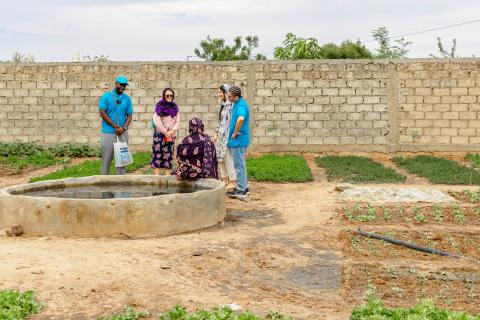
This is the story of how three UNH international changemakers spent their trip in Senegal trying to help a local boarding school (commonly known as Daara) be more self-sustainable and allow its underprivileged students to solely focus on their education.
Background, the project and purpose
Daaras in Senegal commonly house many students aged from 5 to 15. Many households with fewer financial resources decide to send their children to these boarding schools in which they get free education and have their daily life necessities be the responsibility of the Daara. Due to the lack of financial resources, Daaras decide to send the students to the street for daily begging for food and money which exposes them to certain atrocities such as human trafficking and extended periods of hunger.
In this project, our goal was to build a barrier between the students and the begging in Daara Miftawul Hudaa located in Kaolack, Senegal. 392 students are housed in this Daara, with the majority of them engaging in daily begging to make sure they get lunch and dinner. The Daara owns a farm of 5 acres which is their main source of income, and we decided that by helping the farm be more productive and economically profitable, we would install a long-term solution plan to eradicate hunger in the Daara. We also focused on trying to ameliorate the living conditions inside the Daara.
Collectively with our different backgrounds, growing up in underdeveloped countries has allowed us to see first-hand how economic hardships can affect and impact one’s life. Our various experiences made us always want to give back and converge work on projects that focus on economic empowerment, sustainable development, and alleviating the effects of poverty.
When we learned about the grant and the opportunity it could give us to positively impact a whole community all while learning and navigating a different culture, we jumped at it.
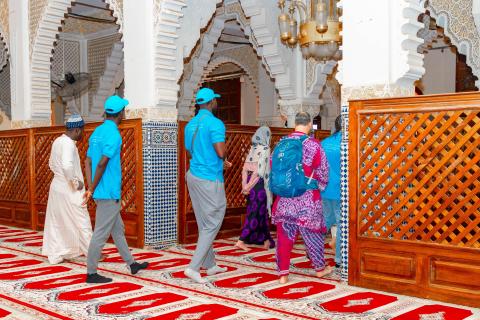
Reflecting on our trip to Senegal
The first couple of days we stayed in Dakar, where we got the chance to visit the “Monument de la Renaissance” and Goree Island, places rich in history which helped us know a little more about the culture of the country. We then traveled to Kaolack where we stayed approximately for a week for the project. In Kaolack, we were able to discuss with the administrators of the school and found out we shared the same values. They, as well, were trying their best to keep the students inside the Daara and fight against the daily hunger to which they were exposed.
It was a thrilling moment to know that we are working with people with whom we share the same mindset.
We thoroughly visited the Daara, the classrooms, and the bedrooms and quickly identified ways living conditions could be improved. We were able, through Full Bucket Foundation’s connection, to meet with the mayor’s office and explained the project and solicited their help for the long-term vision of attaining self-sufficiency in the Daara and they were on board. They promised to include the Daara Miftawul Hudaa to the list of Daaras they give donations periodically and help them in their agricultural projects. We also helped the farm diversify its marketing strategies, now collaborating with a
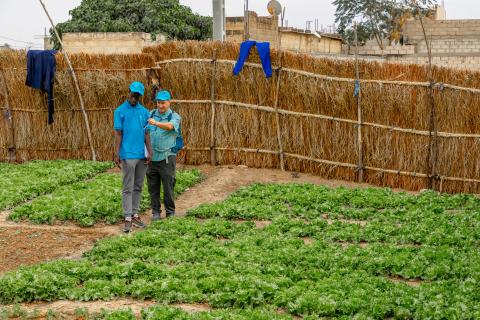
hotel for periodic produce delivery. Accompanied by UNH Extension agricultural field specialist, Seth Wilner after visiting the farm and discussing with the farm manager, we recommended practices that when implemented could easily boost productivity. We also met with the chief of rural development of the district where the farm is located, to solicit her help in the long-term goal that we have for the farm. On top of giving the farm manager free hybrid seeds and offering her input as to how practices could be ameliorated, she offered free hybrid seeds of many crops so they could diversify the crops they grow.
After we identified areas where a quick impact could be made, we worked closely with the administrators of the Daara to come up with a list of materials to purchase. We bought farming equipment to help increase productivity, ceiling fans, sleeping mats and LED lights to improve living conditions inside the Daara.
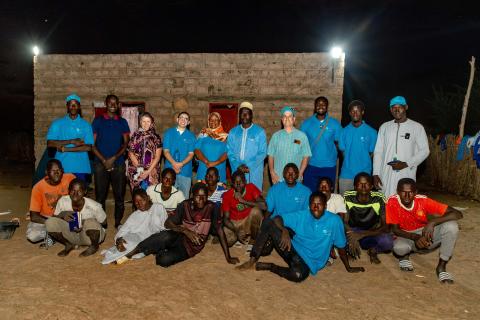
Reflections on community and impact
We left Kaolack fulfilled knowing that we worked on a complex project but were able to do a lot in the week that we stayed in there. Though there was a language barrier, we were able to bond over many things in the short time we stayed in there. Considering that Kaolack is one of the hottest and driest areas of the country (with highs reaching 100 degrees Fahrenheit even in January- supposed to be one of the coldest months), the ceiling fans will likely improve the living conditions in the Daara. The same goes for the sleeping mats, which will allow students to stop sleeping on the floor. The farming equipment will boost productivity by reducing manual labor and thus have a potential for economic growth which will trickle down to the students.
Reflections on the impact on us
The trip to Senegal allowed us to enrich our cultural knowledge, learn about the traditions, and experience the Senegalese hospitality, which amazed us. People were welcoming to us and despite the language barrier would try to talk to us with the little bit of English that they knew.
Despite our differences with the Senegalese community, this experience taught us many things that could unite us, things over which we could still bond.
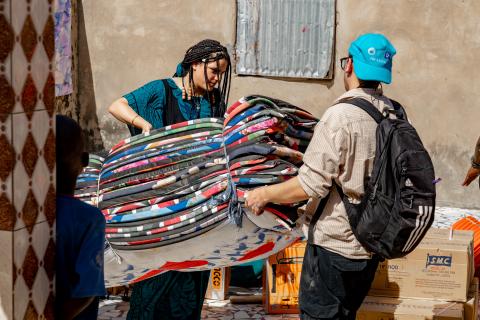
The living conditions inside the Daara humbled us all, but most importantly the joy on the faces of the students, when the truck where the sleeping mats and the ceiling fans were, was being unloaded was a life lesson that will motivate us to work for the remainder of our life towards economic empowerment.
We are grateful the International Changemaker Grant allowed us to take the opportunity to travel to Senegal and participate in such a project. We would like to encourage students to apply for the Grant and participate in meaningful student-designed projects that will help build sustainable development in underdeveloped countries.
